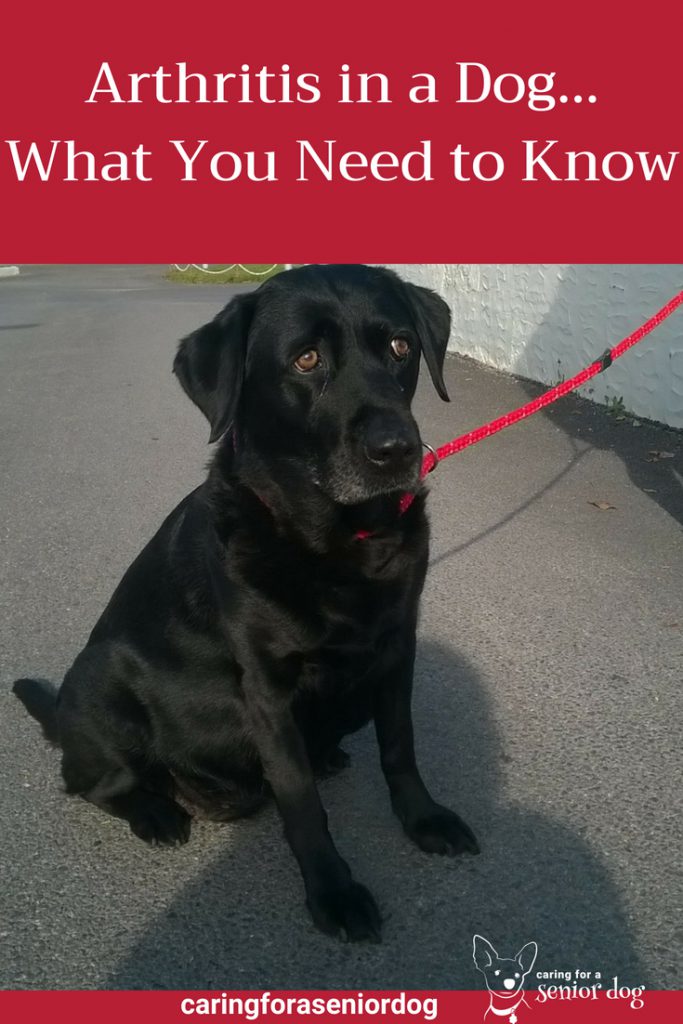
Don’t mistake signs of arthritis in a dog for old age. What many pet guardians see as normal signs of aging, may actually be a dog in pain from the effects of arthritis. Dogs slowing down, having difficulty getting in and out of their bed, and a “seeming” loss of interest in going for walks or playing may be caused by many things, and arthritis is one of them.
UPDATED JULY 28/18
What is arthritis?
Arthritis means inflammation of the joints and there are several types, the most common being osteoarthritis. Dogs can be pretty good at hiding pain, so you may not realise the extent of your dog’s discomfort until his condition has become quite advanced. That’s why it’s so important to keep an eye out for the following symptoms, and even if you feel they are minor a trip to the vet is recommended. Starting treatment in the early stages will prevent your dog suffering, and significantly improve his quality of life.
Are some breeds more likely to get it than others?
While some large breeds are susceptible to developing arthritis, the truth is any dog, any size, any breed can develop it.

Causes of arthritis in dogs
A few of the causes include –
- Result of a trauma or minor injury a dog sustained in the past, even at quite a young age
- Ligament damage
- Lack of exercise – dogs need exercise every day, not just on the weekends. Putting an out of shape dog through a lot of physical exertion two days of the week, is an injury waiting to happen
- Abnormal cartilage development
- Dislocated joint
- Rubbing within the joint
- Strain on tendons and ligaments caused by excess weight
Symptoms
- Stiffness when getting up in the morning or after a nap
- Difficulty lying down
- Reluctance to move around as much as he used to
- Stopped jumping onto the couch
- Prefers shorter walks
- Not running around with his mates at the dog park
- Overweight dog having trouble walking – it may be more than just his weight
- Trouble/avoiding climbing stairs
- Limping
- Uncomfortable in certain positions
- Irritability
- Muscle atrophy
Diagnosing arthritis
It is possible you may suspect your dog has arthritis based on the symptoms listed above, but the only way to get a definitive diagnosis is by seeing your vet.
First your vet will have a chat about what’s been going on, and ask what signs you’ve been seeing that have you concerned. I always recommend making notes ahead of an appointment so you don’t forget anything, and taking a video as well. Having your vet “see” what you’re talking about rather than just relying on a description, can make all the difference.
The next step will be a physical examine where he will likely listen to his heart, lungs, possibly take his temperature and then he will move his hands along your dog’s body, checking for any painful areas. He will also move your dog’s arms and legs to check his range of motion and if he reacts to anything he’s doing. What happens next depends on how your vet works. Some may want blood samples, x rays and even a fluid sample from within a joint in order to get a complete picture, some will just prescribe pain medication and send you on your way, and others will schedule a follow up to check his progress.
I highly recommend you ask questions, make sure you understand what’s going on, and you both have a plan of action. Don’t leave things “hanging.”
Treatment options
There are several pain medications and natural options to consider, so here are a couple of articles you should find helpful.
Pain Relief for Dogs with Arthritis
Managing Arthritis Pain in Dogs
Can arthritis be prevented?
Because arthritis can develop as a result of an injury, treating that injury and making sure it heals properly, can help. Hip dysplasia is another cause, but being genetic, you can’t prevent arthritis from developing. However, knowing whether or not your dog has it means you can avoid certain activities that can make the problem worse (playing frisbee for example), while focusing on gentler forms of exercise such as swimming. Therapies like aquatherapy, laser therapy and acupuncture, turmeric golden paste and supplements such as Glucosamine/Chondroitin and New Zealand Green Lipped Mussels can lessen the effects. Speak to your vet about which ones he recommends.

Mobility aids
It is encouraging to know there are so many ways to make your arthritic dog more comfortable.
A dog ramp can help him get in and out of the car or boat, and on and off the bed. One of the things to keep in mind when looking is the steepness of the incline. Too steep may be difficult for your dog to use, so go for the gradual incline.
Your dog may not be able to go for long walks like he used to, but that doesn’t mean he has to be stuck indoors. I recommend you consider a pet stroller, and I can tell you from experience how life changing it can be. Take it with you when walking the dog, and when he’s done let him ride the rest of the way. It will prevent him from getting bored or depressed stuck at home, you can still get your exercise if you want, and he gets to see his friends like he used to.
Pet stairs are a great help for dogs getting on and off the couch. Whether or not yours could benefit would depend on the height of each step, and the severity of your dog’s condition.
A sling provides extra support and can help your dog walk easier, while taking some of the pressure off his painful joints. To help my dog after spinal surgery, I used a sling to hold up his back end while on walks until he regained the use of his legs.
Yoga mats or interlocking foam mats may not be the most attractive flooring, they will help your dog get around more easily. If your floors are too slippery it may be difficult for your pup to get up from a seated or laying down position, and of course there’s the chance he may slip and hurt himself.
Arthritis in a dog – conclusion
No matter what issue or condition we’re talking about, maintaining your dog’s health through proper nutrition, physical exercise and mental stimulation, will go a long way to increasing his chances of coping with whatever challenges he may face.
Does your dog suffer from arthritis? How have you been helping him manage? Sharing helps others so please leave a comment below, or on my Facebook page.
**There are affiliate links in this post, which means if you purchase anything I make a few pennies…literally. That money helps me help homeless animals through donations and fostering, as well as keeping this blog running. **

Hey, I like your post a lot and was touched that you care about it and wrote it all down.
We had a couple of dogs at home and unfortunately realised it too late.
I think it is great, that you are trying to inform about this topic!
Keep going!
David
Hi David, Thanks for taking the time to comment, and I’m glad you enjoyed the article. It can be difficult determining whether or not your dog is starting to develop arthritis. After all, we expect them to slow down as they age. It doesn’t help that they can be quite good at hiding pain, so we can only do the best we can do.
Hello,
My sister has a small poodle that is way past her age span. So she has a hearing problem, and may get more vulnerable to health complication. However, according to the doc she is pretty healthy dog. Only thing I also noticed is that she is not as active as she was before and I was wondering if it was just her old age or arthritis. Are there any remedies or ways to improve and heal arthritis for dogs? Thank you.
Hi Joon, I appreciate your comment. I’ve known a few small poodles who have lived very long lives, without too many issues. Really great to hear she’s healthy for her age. Your sister is obviously doing a great job. Slowing down doesn’t have to mean arthritis, but of course there are some signs to look out for that may help her determine if it is arthritis. Is she particularly stiff after a nap? Has she stopped jumping up onto furniture (if she ever did!), is it harder for her to walk/does she prefer short walks… Your sister’s vet could determine whether or not it’s arthritis by examining her dog, watching her walk, even x rays. I’m actually going to be starting an article on remedies/supplements for arthritis, so stay tuned for that. Your sister’s vet could prescribe a pain killer to make her dog more comfortable, and there are lots of joint supplements on the market – those that contain green lipped mussels are recommended by my vet, Glucosamine is another popular supplement – people love them, not all vets know much about it. I hope this helped!!
Interesting… Of course, prevention is better than cure. But I just want to ask, is it recommended to give anti-inflammatory and pain relieving medicines for dogs in arthritis? Just like in humans?
Hi Glen, thanks for your comment. As a matter of fact, I will be writing an article, or articles, about remedies and treatment options for arthritis. Anti-inflammatories and pain medications are frequently prescribed by vets, to treat a host of conditions in dogs. The question becomes – how long to keep them on these drugs? It’s impossible to answer that, as every dog’s medical needs are different, which is why it’s important to see your vet as soon as possible. There are lots of supplements and more natural products on the market, that have been known to help – joint supplements, particularly those containing green lipped mussels, Glucosamine… For people who prefer a more homeopathic approach, there are holistic vets who can help.
Hey my cousin’s dog is getting old. I think I’ll pass this on to him. Really useful information you’ve got there 🙂
Hi Ryan, thank you that would be great, anything I can do to help.